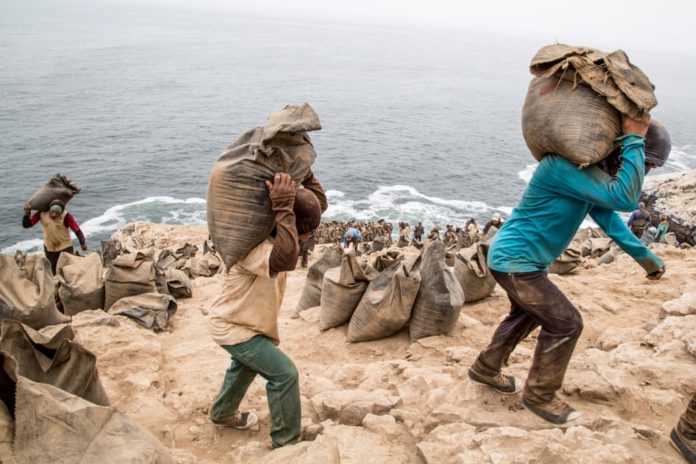As countries around the world wrestle with shortages of imported fertiliser as a result of the Russian invasion of Ukraine, Peru has turned to a tried and tested alternative: bird poo.
In the 19th century, fortunes were made and lost on guano, the potent excrement of fish-eating seabirds which was harvested by enslaved people from Africa and indentured Indigenous and Chinese labourers.
It is a superb organic fertiliser containing an exceptionally high content of nitrogen, phosphate and potassium – all key nutrients essential for plant growth. Guano became such a valuable commodity that Chile fought a war against Peru and Bolivia over its supply in the 1880s.
Now, Peru’s government has launched the aptly named naval vessel Pelicano to transport the pungent cargo from coastal islands and peninsulas to the mainland where prices of imported fertilisers have tripled or quadrupled in price.
Sold at a subsidized price of 50 Peruvian soles (£11.6) for a 50kg sack, guano has been snapped up by farmers who cannot afford the rising prices of chemical fertilisers.
“The guano from the islands is good fertiliser and the price is reasonable,” said Segundo Cruz, a farmer in Mala, an agricultural town about 80km south of Lima. But he was concerned that crops take longer to ripen with guano than with the chemical alternative.
“Due to the increase in fertiliser prices, people are no longer sowing the same amount as before, they are planting just a third of the crop, not as much as before,” he told the Guardian. “It won’t be enough to supply the markets, and prices are going to go up even more.”
Moreover, there is not enough guano to make up for the shortfall for Peru’s 2.4 million small- and medium-scale farmers, of whom around half used imported urea and other fertilisers, according to the agriculture ministry.
“Guano is a very good fertiliser but there’s a natural limit to its supply,” said Eduardo Zegarra, an expert in rural development and a senior researcher at Grade, a thinktank.
“Around 30-40,000 tonnes are extracted [annually], at best 5-10% of the national fertiliser demand which is very, very limited.”
A report by the UN’s food and agriculture organisation has warned that a “perfect storm” of post-pandemic poverty, global inflation and the climate crisis has doubled food insecurity in Peru, affecting more than half, or 50.3%, of the 33 million population.
The price of a 50kg sack of urea has tripled, from about $20 to $65, as imports have fallen by 58% compared with the average of the last seven years, according to agriculture ministry figures.
While Peru’s fertiliser shortage is part of a global problem, local factors – and the erratic leadership of president Pedro Castillo – have only made things worse. Turnover in Peru’s cabinet has reached an all-time high with close to 70 ministers appointed in little more than a year, an average of about one every week. Castillo, a former rural school teacher, is the first sitting president to be criminally investigated for alleged money laundering and belonging to a criminal organisation, along with members of his family and inner circle.
But the son of poor peasant farmers continues, for now, to enjoy support in the rural areas most affected by the fertiliser price increases. “This issue is an achilles heel for the Castillo government,” said Zegarra. “The social base which still views the president with sympathy, or at least with identification, is precisely where this very serious fertiliser crisis is brewing. “If the government does not manage to solve this problem quickly, I believe that the effect on this social base will be very hard.” …
we have a small favour to ask. Tens of millions have placed their trust in the Guardian’s fearless journalism since we started publishing 200 years ago, turning to us in moments of crisis, uncertainty, solidarity and hope. More than 1.5 million supporters, from 180 countries, now power us financially – keeping us open to all, and fiercely independent.
Unlike many others, the Guardian has no shareholders and no billionaire owner. Just the determination and passion to deliver high-impact global reporting, always free from commercial or political influence.
Reporting like this is vital for democracy, for fairness and to demand better from the powerful. And we provide all this for free, for everyone to read. We do this because we believe in information equality.
Greater numbers of people can keep track of the global events shaping our world, understand their impact on people and communities, and become inspired to take meaningful action. Millions can benefit from open access to quality, truthful news, regardless of their ability to pay for it.








